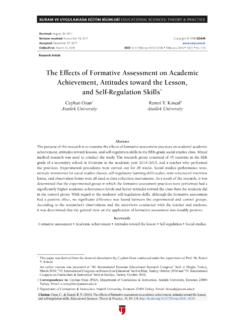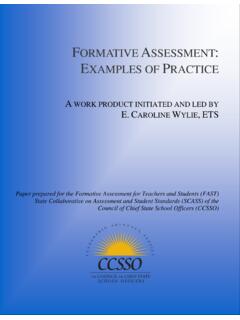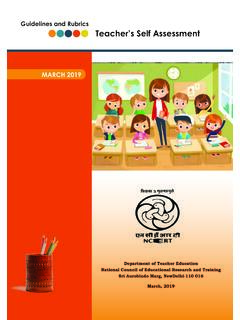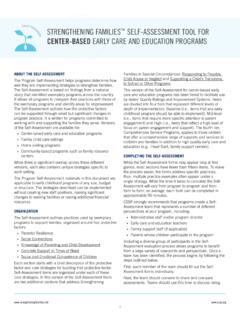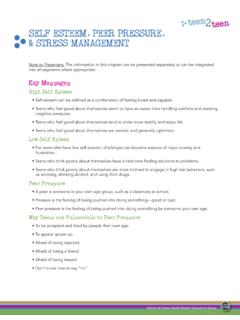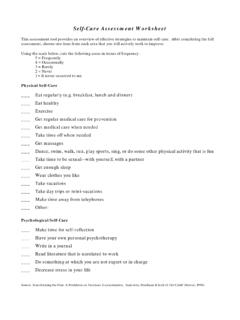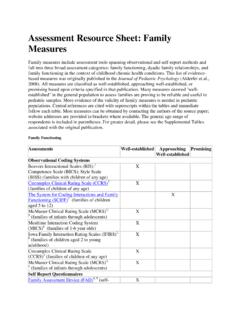Transcription of Compassion Satisfaction/Fatigue Self-Test for Helpers
1 Compassion Satisfaction/Fatigue Self-Test for Helpers Adapted with permission from Figley, , (1995). Compassion Fatigue, New York: Brunner/Mazel. B. Hudnall Stamm, Traumatic Stress Research Group, 1995 -1998 ~ This form may be freely copied as long as (a) authors are credited, (b) no changes are made, & (c) it is not sold. Helping others puts you in direct contact with other people's lives. As you probably have experienced, your Compassion for those you help has both positive and negative aspects. This self -test helps you estimate your Compassion status: This includes your risk of burnout, Compassion fatigue and satisfaction with helping others.
2 Consider each of the following characteristics about you and your current situation. Print a copy of this test so that you can fill out the numbers and keep them for your use. Using a pen or pencil, write in the number that honestly reflects how frequently you experienced these characteristics in the last work week. Then follow the scoring directions at the end of the Self-Test . 0 1 2 3 4 5. Never Rarely A Few Somewhat Often Very Often Times Often Items About You ____1. I am happy. ____2. I find my life satisfying. ____3. I have beliefs that sustain me. ____4. I feel estranged from others.
3 ____5. I find that I learn new things from those I care for. ____6. I force myself to avoid certain thoughts or feelings that remind me of a frightening experience. ____7. I find myself avoiding certain activities or situations because they remind me of a frightening experience. ____8. I have gaps in my memory about frightening events. ____9. I feel connected to others. ____10. I feel calm. ____11. I believe that I have a good balance between my work and my free time. ____12. I have difficulty falling or staying asleep. ____13. I have outburst of anger or irritability with little provocation ____14.
4 I am the person I always wanted to be. ____15. I startle easily. ____16. While working with a victim, I thought about violence against the perpetrator. ____17. I am a sensitive person. ____18. I have flashbacks connected to those I help. ____19. I have good peer support when I need to work through a highly stressful experience. ____20. I have had first-hand experience with traumatic events in my adult life. ____21. I have had first-hand experience with traumatic events in my childhood. ____22. I think that I need to "work through" a traumatic experience in my life. ____23. I think that I need more close friends.
5 ____24. I think that there is no one to talk with about highly stressful experiences. ____25. I have concluded that I work too hard for my own good. ____26. Working with those I help brings me a great deal of satisfaction. ____27. I feel invigorated after working with those I help. 1 of 5. Compassion Satisfaction/Fatigue Self-Test for Helpers - CONTINUED. 0 1 2 3 4 5. Never Rarely A Few Somewhat Often Very Often Times Often ____28. I am frightened of things a person I helped has said or done to me. ____29. I experience troubling dreams similar to those I help. ____30. I have happy thoughts about those I help and how I could help them.
6 ____31. I experienced intrusive thoughts of times with especially difficult people I helped. ____32. I have suddenly and involuntarily recalled a frightening experience while working with a person I helped. ____33. I am preoccupied with more than one person I help. ____34. I am losing sleep over a person I help's traumatic experiences. ____35. I have joyful feelings about how I can help the victims I work with. ____36. I think that I might have been "infected" by the traumatic stress of those I help. ____37. I think that I might be positively "inoculated" by the traumatic stress of those I help.
7 ____38. I remind myself to be less concerned about the well being of those I help. ____39. I have felt trapped by my work as a helper. ____40. I have a sense of hopelessness associated with working with those I help. ____41. I have felt "on edge" about various things and I attribute this to working with certain people I help. ____42. I wish that I could avoid working with some people I help. ____43. Some people I help are particularly enjoyable to work with. ____44. I have been in danger working with people I help. ____45. I feel that some people I help dislike me personally. Items About Being a Helper and Your Helping Environment ____46.
8 I like my work as a helper. ____47. I feel like I have the tools and resources that I need to do my work as a helper. ____48. I have felt weak, tired, run down as a result of my work as helper. ____49. I have felt depressed as a result of my work as a helper. ____50. I have thoughts that I am a "success" as a helper. ____51. I am unsuccessful at separating helping from personal life. ____52. I enjoy my co-workers. ____53. I depend on my co-workers to help me when I need it. ____54. My co-workers can depend on me for help when they need it. ____55. I trust my co-workers. ____56. I feel little Compassion toward most of my co-workers ____57.
9 I am pleased with how I am able to keep up with helping technology. ____58. I feel I am working more for the money/prestige than for personal fulfillment. ____59. Although I have to do paperwork that I don't like, I still have time to work with those help. ____60. I find it difficult separating my personal life from my helper life. ____61. I am pleased with how I am able to keep up with helping techniques and protocols. ____62. I have a sense of worthlessness/disillusionment/resentment associated with my role as a helper. ____63. I have thoughts that I am a "failure" as a helper. ____64.
10 I have thoughts that I am not succeeding at achieving my life goals. ____65. I have to deal with bureaucratic, unimportant tasks in my work as a helper. ____66. I plan to be a helper for a long time. 2 of 5. Index of Clinical Stress (Abel, 1991). Name:_____ Date:_____. This questionnaire is designed to measure the way you feel about the amount of personal stress that you experience. It is not a test, so there are no right or wrong answers. Answer each item as carefully and as accurately as you can by placing a number beside each one as follows: 1=None of the time 2=Very little 3=A little of the time 4=Some of the time 5=A good part of the time 6=Most of the time 7=All of the time 1.


